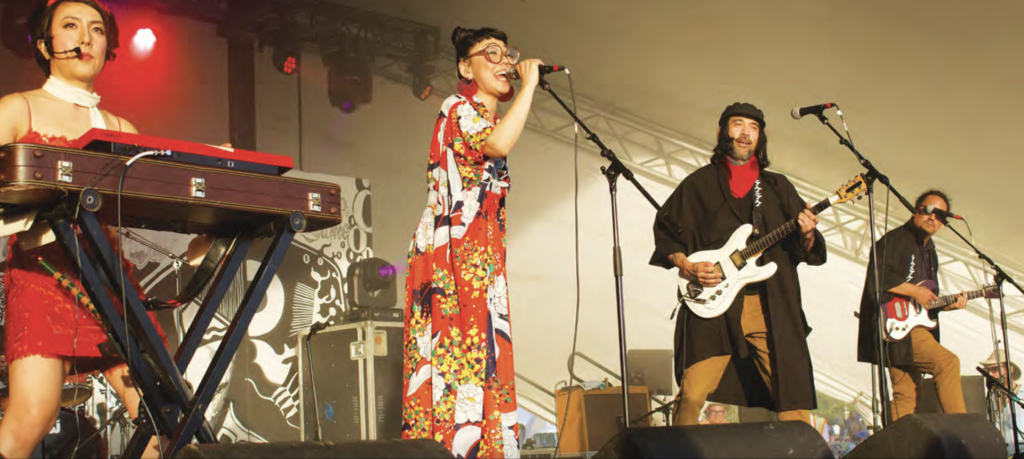*Content from last Summer!*

by Myles Tiessen
TEKE::TEKE took to the Big Bluestem stage after a long and hot day in Birds Hill Provincial Park at the Winnipeg Folk Festival. Heat exhaustion and dehydration were taking hold of the crowd, and engagement was low. But, as the band launched into the first song of the buzzy and feedback-heavy set, a wave of jubilation washed over attendees and everyone was locked into the mesmerizing talent of TEKE::TEKE.
An attentive crowd is vital for TEKE::TEKE. The band relies heavily on the audience for the allowance to freely express their limitless creativity. Being onstage with a unified audience is, as guitarist Hidetaka Yoneyama states it, “nourishment to the brain.”
Yoneyama says that symbiosis with the crowd means the Montreal-based Japanese seven-piece can unlock newfound artistry and explore their musical potential. Call it psychedelic, prog, motorik, whatever you want, TEKE::TEKE’s foray into the musical unknown is mind-boggling to witness in person. Being in the crowd that Friday night at Folk Fest was an experience unlike any other–a community of folks engulfed in the experimental tendencies of a band truly united with their audience. “It’s like a communication we are doing on stage. We are not just going up and making noise; it is very important to have the reaction from people.” Yoneyama humorously simplifies; “people were so positive, and there was a good vibe.”
“We are a band of humans, and the [audience] is very important to us,” says Yoneyama. “The connection with people made us who we are now.”
TEKE::TEKE is composed of artists who used their diverse backgrounds in everything from acting to classical music and jazz to create their most recent critically renowned album Shirushi. Over a sprawling nine songs, the band collided traditional Japanese instruments like the shinobue and taisho koto with fuzzy guitars to create an opulent cinematic experience. TEKE::TEKE are masters of genre-bending, and Shirushi lands delicately in the middle of modern punk, experimental Japanese movie scores, and 1960s surf music.
“We come together with ideas, and we cut and destroy [the songs],” says Yoneyama. “It’s positive destruction.”
Writing songs backward, cutting out verses and instrumental breaks, changing tempos, and adding uncommon instruments are all part of kintsugi’s destructive/constructive process that influenced the album’s name and concept. Yoneyama says his background as a classical musician and love for Japanese industrial noise music inspired him to reach into his toolbox and pull out a pair of pliers on stage when playing his guitar. Yoneyama says that the juxtaposition of beauty and ugliness informs TEKE::TEKE songs.
As the sun set on Yoneyama using his pliers onstage at Folk Fest, the mass of fans packed closely to the stage let out roaring praises and exclamations just as rampant and fiery as the audacious sneer of metal machinery on metal instruments. “We want [our performances] to be a little dirty and not too clean. That is the way we [express] the energy of TEKE::TEKE,” say Yoneyama.
TEKE::TEKE tore through their set at an unrelenting pace, only stopping to tune or fix a few technical issues (except for the very end when band member Serge Nakauchi Pelletier sheepishly asked the crowd if he could take a photo of them). Though the band emphasizes audience connection, TEKE::TEKE rarely took time for stage banter. Instead, they let their music do the talking. Barreling through songs from Shirushi, the astounding visual and audio spectacle put the crowd uniformly in a state of ecstasy.
“Without the audience, we don’t know where to throw our energies. I remember the first live show we did after the [COVID-19 pandemic]; it was as if we were exploding! We have always been linked to the audience, but it feels like we are more linked to them now.”

